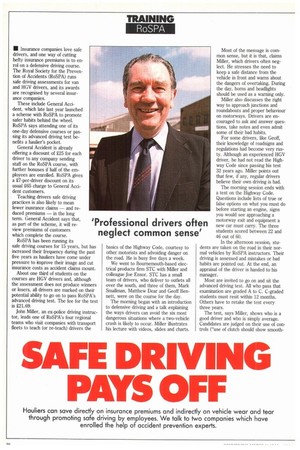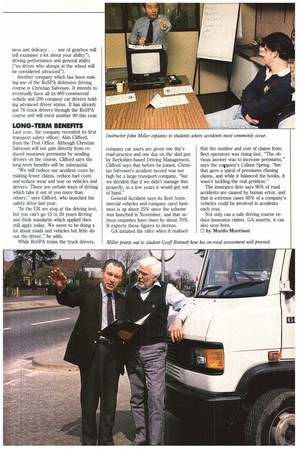• Insurance companies love safe drivers, and one way of
Page 52

Page 53

If you've noticed an error in this article please click here to report it so we can fix it.
cutting hefty insurance premiums is to enrol on a defensive driving course. The Royal Society for the Prevention of Accidents (RoSPA) runs safe driving assessments for van and HGV drivers, and its awards are recognised by several insurance companies.
These include General Accident, which late last year launched a scheme with RoSPA to promote safer habits behind the wheel. RoSPA says attending one of its one-day defensive courses or passing its advanced driving test benefits a haulier's pocket.
General Accident is already offering a discount of 225 for each driver to any company sending staff on the RoSPA course, with further bonuses if half of the employees are enrolled. RoSPA gives a 27-per-driver discount on its usual 265 charge to General Accident customers.
Teaching drivers safe driving practices is also likely to mean fewer inusrance claims — and reduced premiums — in the long term. General Accident says that, as part of the scheme, it will review premiums of customers which complete the course.
RoSPA has been running its safe driving courses for 15 years, but has increased their frequency during the past five years as hauliers have come under pressure to improve their image and cut insurance costs as accident claims mount.
About one third of students on the courses are HGV drivers and, although the assessment does not produce winners or losers, all drivers are marked on their potential ability to go on to pass RoSPA's advanced driving test. The fee for the test is 221.69.
John Miller, an ex-police driving instructor, leads one of RoSPA's four regional teams who visit companies with transport fleets to teach (or re-teach) drivers the basics of the Highway Code, courtesy to other motorists and advoiding danger on the road. He is busy five days a week.
We went to Bournemouth-based electrical products firm STC with Miller and colleague Joe Ensor. STC has a small team of drivers, who deliver to outlets all over the south, and three of them, Mark Smallman, Matthew Dear and Geoff Bennett, were on the course for the day.
The morning began with an introduction to defensive driving and a talk explaining the ways drivers can avoid the six most dangerous situations where a two-vehicle crash is likely to occur. Miller illustrates his lecture with videos, slides and charts. Most of the message is common sense, but it is that, claims Miller, which drivers often neglect. He stresses the need to keep a safe distance from the vehicle in front and warns about the dangers of overtaking. During the day, horns and headlights should be used as a warning only.
Miller also discusses the right way to approach junctions and roundabouts and proper behaviour on motorways. Drivers are encouraged to ask and answer questions, take notes and even admit some of their bad habits.
For some drivers, like Geoff, their knowledge of roadsigns and regulations had become very rusty. Although an experienced HGV driver, he had not read the Highway Code since passing his test 32 years ago. Miller points out that few, if any, regular drivers believe their own driving is bad.
The morning session ends with a test on the Highway Code. Questions include lists of true or false options on what you must do before starting an engine, signs you would see approaching a motorway exit and equipment a new car must carry. The three students scored between 22 and 46 out of 60.
In the afternoon session, students are taken on the road in their normal vehicles by RoSPA instructors. Their driving is assessed and mistakes or bad habits are pointed out. At the end, an appraisal of the driver is handed to his manager.
Most are invited to go on and sit the advanced driving test. All who pass that examination are graded A to C. C-graded students must resit within 12 months. Others have to retake the test every three years.
The test, says Miller, shows who is a good driver and who is simply average. Candidates are judged on their use of controls ("use of clutch should show smooth ness and delicacy. . . use of gearbox will tell examiner a lot about your ability"), driving performance and general ability ("no driver who slumps at the wheel will be considered advanced").
Another company which has been making use of the RoSPA defensive driving course is Christian Salvesen. It intends to eventually have all its 600 commercial vehicle and 200 company car drivers holding advanced driver status. It has already put 76 truck drivers through the ROSPA course and will enrol another 90 this year, Last year, the company recruited its first transport safety officer, Alan Clifford, from the Post Office. Although Christian Salvesen will not gain directly from reduced insurance premiums by sending drivers on the course, Clifford says the long-term benefits will be substantial.
"We will reduce our accident costs by making fewer claims, reduce fuel costs and reduce wear and tear on vehicles and drivers. There are certain ways of driving which take it out of you more than others," says Clifford, who launched the safety drive last year, "In the UK we stop at the driving test, but you can't go 15 to 20 years driving and think standards which applied then still apply today. We seem to be doing a lot about roads and vehicles but little about the driver," he adds.
While RoSPA trains the truck drivers, company car users are given one day's road practice and one day on the skid pan by Berkshire-based Driving Management. Clifford says that before he joined, Christian Salvesen's accident record was not high for a large transport company, "but we decided that if we didn't manage this properly, in a few years it would get out of hand."
General Accident says its fleet (commercial vehicles and company cars) business is up about 25% since the scheme was launched in November, and that serious enquiries have risen by about 70%. It expects these figures to increas.
GA initiated the offer when it realised that the number and cost of claims from fleet operators was rising fast. "The obvious answer was to increase premiums," says the corpany's Callum Spring, "but that gave a spiral of premiums chasing claims, and while it balanced the books, it wasn't tackling the real problem."
The insurance firm says 90% of road accidents are caused by human error, and that in extreme cases 65% of a company's vehicles could be involved in accidents each year.
Not only can a safe driving course reduce insurance claims, GA asserts, it can also save lives.
0 by Murdo Morrison
























































































































